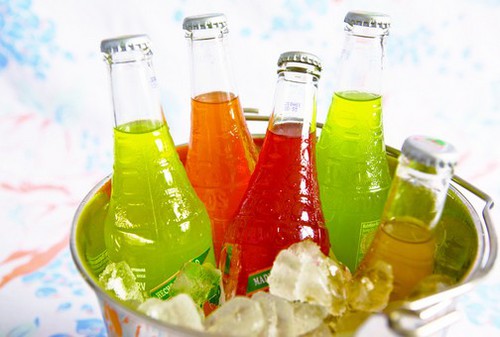- 用心翻译每一天
联系我们
全国统一服务热线:
电话:021-58446796
公司QQ:732319580
邮箱:daisy.xu@easytranslation.com.cn
网址:www.easytranslation.com.cn
地址:上海浦东金桥开发区金豫路700号6号楼1楼
Possible link between sugary drinks and cancer 含糖饮料与癌症之间可能存在联系 上海译锐翻译 2019-7-12 16:23 P.M. A study published by The BMJ today reports a possible association between higher consumption of sugary drinks and and an increased risk of cancer. 今日发表于BMJ(《英国医学杂志》)的一篇研究报告表明,摄入更多的含糖饮料可能和癌症风险增加之间存在联系。 While cautious interpretation is needed, the findings add to a growing body of evidence indicating that limiting sugary drink consumption, together with taxation and marketing restrictions, might contribute to a reduction in cancer cases. 尽管仍需要慎重解释,研究结果和不断扩大的证据数量表明,限制摄入含糖饮料、采取征税政策以及进行营销限制可能会减少癌症病例。 The consumption of sugary drinks has increased worldwide during the last few decades and is convincingly associated with the risk of obesity, which in turn is recognized as a strong risk factor for many cancers. But research on sugary drinks and the risk of cancer is still limited. So a team of researchers based in France set out to assess the associations between the consumption of sugary drinks (sugar sweetened beverages and 100% fruit juices), artificially sweetened (diet) beverages, and risk of overall cancer, as well as breast, prostate, and bowel (colorectal) cancers. 在过去的几十年来,在全球范围内,含糖饮料的摄入不断正价并且显然和肥胖风险相连。而这反过来被认为是多种癌症的强烈风险因素。但是有关含糖医疗和患癌风险的研究却仍然有限。因此,法国的研究团队决定评估含糖饮料(利用糖来实现甜味口感的饮料和100%果汁)、人工增甜的(饮食)和饮料与总体癌症风险以及乳腺癌、前列腺癌以及大肠直肠癌之间的关联。 Their findings are based on 101,257 healthy French adults (21% men; 79% women) with an average age of 42 years at inclusion time from the NutriNet-Santé cohort study. 他们的研究结果来自于NutriNet-Santé 群组研究中平均年龄在42岁的101,257位健康的法国成年人(21%为男性;79%为女性)。 Participants completed at least two 24-hour online validated dietary questionnaires, designed to measure usual intake of 3,300 different food and beverage items and were followed up for a maximum of 9 years (2009-2018). 参与者至少完成2项验证性的24小时在线饮食调查问卷。该问卷旨在测定3,300种食品和饮料常规的摄入量并随后在长达9年的时间(2009-2018)里对受试人群进行跟进。 Daily consumption of sugary drinks (sugar sweetened beverages and 100% fruit juices) and artificially sweetened (diet) beverages were calculated and first cases of cancer reported by participants were validated by medical records and linked with health insurance national databases. 研究计算了含糖饮料(用糖获得甜味的饮料和100%果汁)以及人工增甜(饮食)饮料的日常饮用量。由参与者所报告的第一批癌症病例已经过病例报告的验证并与健康保险国家数据库相联系。 Several well known risk factors for cancer, such as age, sex, educational level, family history of cancer, smoking status and physical activity levels, were taken into account. 若干个众所周知的致癌风险因素,比如年龄、性别、教育水平、癌症家族史、吸烟史以及锻炼程度也在考虑范围之内。 Average daily consumption of sugary drinks was greater in men than in women (90.3 mL v 74.6 mL, respectively). During follow-up 2,193 first cases of cancer were diagnosed and validated (693 breast cancers, 291 prostate cancers, and 166 colorectal cancers). Average age at cancer diagnosis was 59 years. 男性平均每日含糖饮料的摄入量要大于女性(分别为90.3mL和74.6mL)。在跟进过程中,首批2,193例癌症被诊断并被验证(乳腺癌693例、前列腺癌291例,大肠直肠癌166例)。受试者被诊断为癌症的平均年龄为59岁。 The results show that a 100 mL per day increase in the consumption of sugary drinks was associated with an 18% increased risk of overall cancer and a 22% increased risk of breast cancer. When the group of sugary drinks was split into fruit juices and other sugary drinks, the consumption of both beverage types was associated with a higher risk of overall cancer. No association was found for prostate and colorectal cancers, but numbers of cases were more limited for these cancer locations. 结果表明,每年多喝100mL含糖饮料,患有一般癌症的风险就是增加18%,而患乳腺癌的风险就会增加22%。当一组含糖饮料被分为果汁和其他类含糖饮料时,两种类型的饮料摄入量与一般癌症患病风险增高有关。含糖饮料与前列腺和大肠直肠癌之间的联系还未发现,但是大多数癌症病例都集中于这些部位。 Prostate:['prɑ.steɪt]前列腺 Colorectal:[ˌkoʊlə'rektəl]大肠直肠 In contrast, the consumption of artificially sweetened (diet) beverages was not associated with a risk of cancer, but the authors warn that caution is needed in interpreting this finding owing to a relatively low consumption level in this sample. 与之相反,人工增甜(饮食)饮料的深入与患癌风险没有相关性。但是,作者警告称,在解释这一结果时,需采取审慎的态度,这主要是因为人工增甜(饮食)饮料的摄入量相对较低。 Possible explanations for these results include the effect of the sugar contained in sugary drinks on visceral fat (stored around vital organs such as the liver and pancreas), blood sugar levels, and inflammatory markers, all of which are linked to increased cancer risk. 针对这些结果可能存在以下解释,具体包括含糖饮料中的糖分对内脏脂肪(存储于重要器官,比如肝脏和胰腺周边)、血糖值以及炎症标志物的影响。这三种都与不断增加的患癌风险相关。 visceral fat:内脏脂肪 Pancreas:['pæŋkriəs]胰腺 Other chemical compounds, such as additives in some sodas might also play a role, they add. This is an observational study, so can't establish cause, and the authors say they cannot rule out some misclassification of beverages or guarantee detection of every new cancer case. 其他化学合成物,比如某些苏打水中的添加剂可能也发挥了重要的作用,研究者补充表示。这是一项观察性的研究,因此无法明确原因。作者表示,他们无法排除某些饮料被错误分类或保证发现每一个新的癌症病例。 rule out: 不考虑; 排除 Nevertheless, the study sample was large and they were able to adjust for a wide range of potentially influential factors. What's more, the results were largely unchanged after further testing, suggesting that the findings withstand scrutiny. 然而, 研究的抽查对象众多,研究者们能够针对种类广泛的潜在影响因子进行调整。更重要的是,在进一步测试后,研究结果基本没有变化,这表明,研究结果接受住了仔细检验。 These results need replication in other large scale studies, say the authors. 作者表示,这些结果需要在其他大规模的研究中进行复制。 "These data support the relevance of existing nutritional recommendations to limit sugary drink consumption, including 100% fruit juice, as well as policy actions, such as taxation and marketing restrictions targeting sugary drinks, which might potentially contribute to the reduction of cancer incidence," they conclude. 他们的结论是:“这些数据证实,现存的、限制含糖饮料摄入(包括100%果汁)的营养建议以及政策行动,比如针对含糖饮料进行征税和设定营销限制具有关联性,而这可能潜在地有助于减少癌症的发生率。” Incidence:(尤指罪行、疾病等的)发生率 Contribute to:有助于 文章来源:科学日报 编辑:Susan